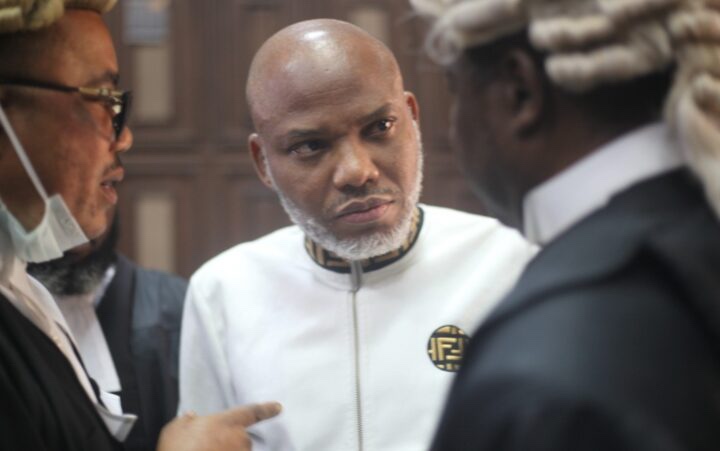The family of the leader of the Indigenous People of Biafra (IPOB), Nnamdi Kanu, has decried the Supreme Court’s delay in the release of the Certified True Copy (CTC) of its ruling on Kanu’s matter.

The Supreme Court had on December 15, 2023, set aside the ruling of the Appeal Court which had in its earlier verdict, set the IPOB free from the terrorism charges slammed against him by the Federal Government.
The apex court ruled that instead, Kanu should be tried at the appropriate court.
The head of the Kanu family, Kanunta Kanu, said in a statement that the non-release of the CTC by the Supreme Court was jeopardizing further legal moves the family could have taken.
Kanu said discreet investigations the family carried out revealed that the justices of the apex court who sat on the matter were yet to append their signatures on the judgment, more than four weeks after it was delivered.
He wondered why the justices of the Supreme Court who sat on their son’s matter would allow the normal 14 days to elapse without signing the judgment.
The Kanu family said it smelled a rat in the whole delay, adding that unlawfully withholding of the CTC in the case of the IPOB leader shows Nigeria cannot obey her treaty obligations which he said amounted to official terrorism.
“Unlawfully withholding the CTC in the case of Mazi Nnamdi Kanu, has confirmed that Nigeria will not obey her treaty obligations,” he said.
“These justices, the presidency, and the Nigerian entity are officially terrorists according to the laws of Nigeria.”
Quoting Section 2 (3)(f) of the Terrorism (Prevention & Prohibition) Act, 2022, Kanu said, “In this Act “act of terrorism” means an act wilfully performed with the intention of furthering an ideology, whether political, religious, racial, or ethnic and which violates the provisions of any international treaty or resolution to which Nigeria is a party, subject to the provisions of section 12 of the Constitution of the Federal Republic of Nigeria, 1999; and Cap C23, LFN 2004.”
The family urged the Supreme Court to release the CTC of Kanu’s case to enable her to shop for other options.
Court adjourns Kanu’s N1bn suit against FG till March 4
Justice James Omotosho of the Federal High Court Abuja has fixed further hearing for March 4, 2024 in a fresh N1 billion suit filed by the detained leader of the proscribed Indigenous People of Biafra (IPOB), Nnamdi Kanu, against the Federal Government and three others.
The others are the Attorney General of the Federation (AGF), the Department of State Services (DSS), and its Director General, Yusuf Bichi.
Justice James Omotosho rescheduled hearing in the fundamentals rights enforcement suit on Monday following the absence of the applicant’s lawyer.
At the mention of the case, no lawyer announced appearance for the applicant, while the respondents were represented by two lawyers Enoch Simon (for the Federal Government and the AGF) and I. Awo for the DSS.
Simon informed the court that his clients were only served with the hearing notice and had not been served with the suit’s originating processes.
The lawyer said he was in court out of respect for the law.
After listening to the lawyers, Justice Omotosho adjourned till March 4 for hearing and ordered that a hearing notice be issued and served on the applicant.
In the suit filed for Kanu by his lawyer, Aloy Ejimakor, the IPOB leader is seeking a declaration that the respondents’ act of forcible seizure and photocopying of confidential legal documents pertaining to facilitating the preparation of his defence, which were brought to him at the respondents’ detention facility by his lawyers, amounted to denial of his rights to be defended by legal practitioners of his own choice.
He also sought a declaration that the respondents’ act of refusing or preventing his counsel from taking notes of details of counsel’s professional discussions/consultations with him at DSS detention, with said discussions/consultations relating to preparation of his defence amounted to denial of his right to be given adequate facilities for the preparation of his defence by legal practitioners of his own choice, among others.